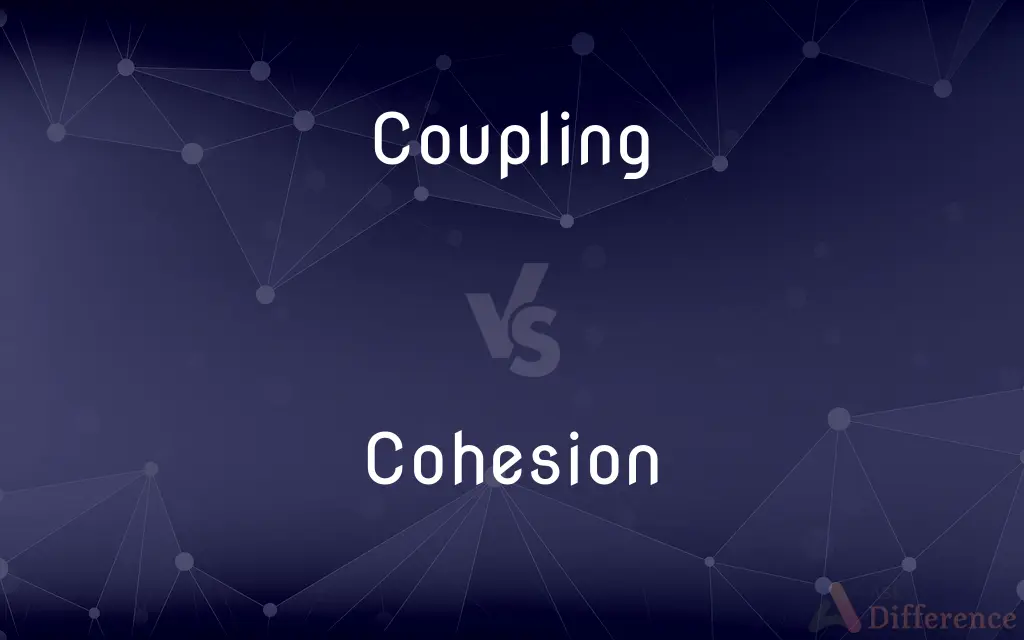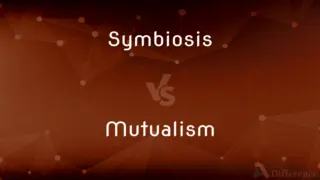Coupling vs. Cohesion — What's the Difference?

Difference Between Coupling and Cohesion
ADVERTISEMENT
Compare with Definitions
Coupling
A coupling is a device used to connect two shafts together at their ends for the purpose of transmitting power. The primary purpose of couplings is to join two pieces of rotating equipment while permitting some degree of misalignment or end movement or both.
Cohesion
The act, process, or condition of cohering
Exhibited strong cohesion in the family unit.
Coupling
The act of linking together or forming couples.
Cohesion
(Physics) The intermolecular attraction by which the elements of a body are held together.
Coupling
The act of uniting sexually.
ADVERTISEMENT
Cohesion
(Botany) The congenital union of parts of the same kind, such as a calyx of five united sepals.
Coupling
A device that links or connects.
Cohesion
State of cohering, or of working together.
Unit cohesion is important in the military.
Coupling
(Electronics) The transfer of electricity from one circuit to another.
Cohesion
Various intermolecular forces that hold solids and liquids together.
Coupling
(Chemistry) Facilitation or acceleration of one chemical process due to the presence or action of another.
Cohesion
(biology) Growing together of normally distinct parts of a plant.
Coupling
The body part of a four-footed animal that connects the hindquarters to the forequarters.
Cohesion
(software engineering) Degree to which functionally related elements in a system belong together.
Coupling
Act of joining together to form a couple.
Cohesion
(linguistics) Grammatical or lexical relationship between different parts of the same text.
Coupling
A device that couples two things together.
Cohesion
The act or state of sticking together; close union.
Coupling
(software engineering) The degree of reliance between two or more software modules.
Cohesion
That from of attraction by which the particles of a body are united throughout the mass, whether like or unlike; - distinguished from adhesion, which unites bodies by their adjacent surfaces.
Solids and fluids differ in the degree of cohesion, which, being increased, turns a fluid into a solid.
Coupling
(electronics) A connection between two electronic circuits such that a signal can pass between them.
Cohesion
Logical agreement and dependence; as, the cohesion of ideas.
Coupling
(physics) The property of physical systems that they are interacting with each other
Cohesion
The state of cohering or sticking together
Coupling
(sexuality) Sexual intercourse.
Cohesion
(botany) the process in some plants of parts growing together that are usually separate (such as petals)
Coupling
Present participle of couple
Cohesion
(physics) the intermolecular force that holds together the molecules in a solid or liquid
Coupling
The act of bringing or coming together; connection; sexual union.
Coupling
A device or contrivance which serves to couple or connect adjacent parts or objects; as, a belt coupling, which connects the ends of a belt; a car coupling, which connects the cars in a train; a shaft coupling, which connects the ends of shafts.
Coupling
A connection (like a clamp or vise) between two things so they move together
Coupling
A mechanical device that serves to connect the ends of adjacent objects
Coupling
The act of pairing a male and female for reproductive purposes;
The casual couplings of adolescents
The mating of some species occurs only in the spring
Share Your Discovery

Previous Comparison
Symbiosis vs. Mutualism
Next Comparison
Spring vs. Fountain













































